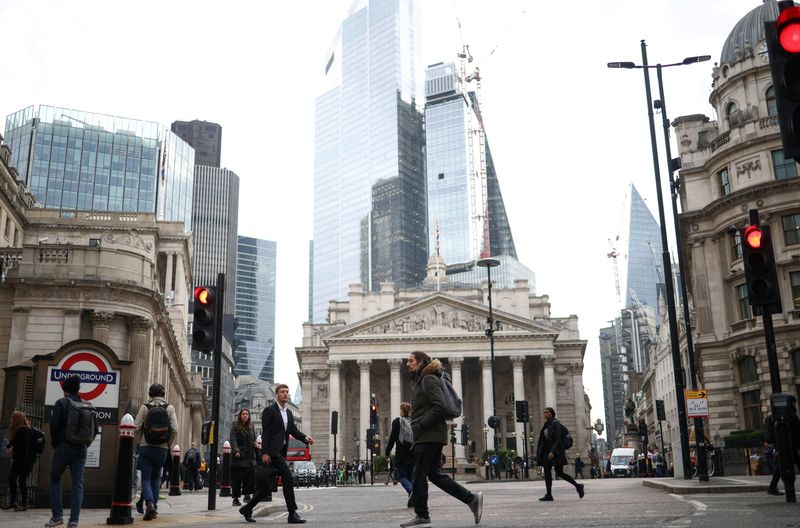LONDON (Reuters) - Britain, for now, remains the key to whether a calmer mood can take a hold in markets unnerved by turmoil in the UK that has stoked wider worries about financial stability.
Traders are back on Japanese yen intervention watch, while the U.S. earnings season and a congress of China's ruling Communist Party kick off.
Here's a look at the week ahead in markets from Kevin Buckland in Tokyo, Lewis Krauskopf in New York, and Tommy Wilkes and Dhara Ranasinghe in London. Graphics by Vincent Flasseur.
1/ BUYER OF LAST RESORT
Barring a last-minute extension, from Monday the Bank of England will no longer be the buyer of last resort of battered British bonds.
The government's "mini-Budget" on Sept. 23 sparked some of the biggest ever jumps in UK bond yields, spooked wider markets and triggered a crisis among pension funds needing to find bucket loads of cash.
The BoE has been forced to intervene repeatedly to ensure financial stability, even as those measures contradict its task of fighting inflation by jacking up interest rates and selling some of the bonds it owns.
The pensions industry has warned schemes aren't ready for bond-buying to end, while the government has suggested that if more volatility ensues the blame lies with the BoE. Growing expectations of a government u-turn on most of its unfunded tax cuts should end much of the pain. If it doesn't, buckle up for a messy Monday.
Graphic: UK government bond yields surge- https://graphics.reuters.com/GLOBAL-THEMES/lbvgnqdxapq/chart.png
2 /STRESS TEST
On top of UK turmoil, unease triggered by decades-high inflation, an energy shock and aggressive global rate hikes are putting markets through a stress test.
The carnage in British gilts has exposed vulnerabilities in the pensions sector, shining a light on financial stability risks. So, the coming days will see increased focus on other possible hot spots that have gone under the radar of regulators.
The IMF warns of "disorderly asset repricings" and "financial market contagion." Asset manager PIMCO reckons the UK is unlikely to be the only source of instability, adding that loan and private credit markets may also face stress.
Graphic: U.S. fixed income market volatility- https://graphics.reuters.com/GLOBAL-MARKETS/mypmndrzzvr/NkKjm-u-s-fixed-income-market-volatility.png
3/ EARNINGS SEASON
The third-quarter U.S. earnings season heats up as companies report results in the throes of a difficult operating environment given a strengthening dollar and surging inflation.
Earnings for S&P 500 companies overall are expected to have climbed 4.1% from the year-earlier period, which would be the slowest growth since the fourth quarter of 2020.
But more focus may be on how executives project the future; consensus analyst estimates are for a nearly 8% rise in profits next year, according to Refinitiv IBES, but many investors are dubious of that forecast as recession risks loom.
A market slide has moderated stock valuations, but a downgrade in the earnings outlook could dampen equities' attractiveness. Upcoming earnings reports includes results from Tesla (NASDAQ:TSLA), Netflix (NASDAQ:NFLX) and Johnson & Johnson (NYSE:JNJ).
Graphic: Spooky U.S. earnings season- https://graphics.reuters.com/GLOBAL-MARKET/zgpomqdxnpd/chart.png
4/ NOT THE ECONOMY, COMRADE
China's twice-a-decade Communist party congress kicks off on Sunday, and the week-long, closed-door assembly is set to hand Xi Jinping an unprecedented third five-year term as supreme leader, securing his place as the country's most powerful ruler since Mao Zedong.
It puts Xi in a position to pursue his vision for the "rejuvenation of the Chinese nation," which includes the "common prosperity" policies that toppled behemoths including Alibaba (NYSE:BABA) and Evergrande. A desire to bring Taiwan under Beijing's control is also ramping up tensions with Washington.
As for the economy, Xi has let that fall victim to other priorities: growth is set to miss a 5.5% target after repeated lockdowns under the zero-COVID programme. The latest reading of gross domestic product is due Tuesday, after growth ground to a virtual halt in the second quarter.
Hopes of pandemic controls relaxing at this congress could prove unfounded, considering how Beijing met a flare-up in cases just beforehand by barring many travelers in the recent Golden Week holiday from returning to the capital.
Graphic: China's tepid economic growth-https://graphics.reuters.com/GLOBAL-MARKETS/xmpjozwqzvr/chart.png
5/ INTERVENTION WATCH
Traders are back on currency intervention watch as the dollar scales fresh 24-year peaks to the yen and heads back towards multi-year highs versus the Chinese yuan and Korean won.
Japan's currency careened to the cusp of 147 per dollar on Wednesday, crashing through the trough at 145.89 that spurred the Bank of Japan to intervene last month to support the yen for the first time since 1998.
South Korea also sold billions of dollars last quarter to prop up its currency, as the won plumbed a 13-year low just shy of 1,445 per dollar last month. Even so, it's not strayed far from there, nearing 1,440 this week.

China has likely been deploying state banks to sell dollars and cushion the yuan's slide to ever-deeper 14-year lows, and traders are jittery over more aggressive steps to come.
Graphic: Japan's history of supporting yen- https://graphics.reuters.com/GLOBAL-MARKETS/jnpweqoqxpw/tLg3Z-japan-s-history-of-supporting-yen.png